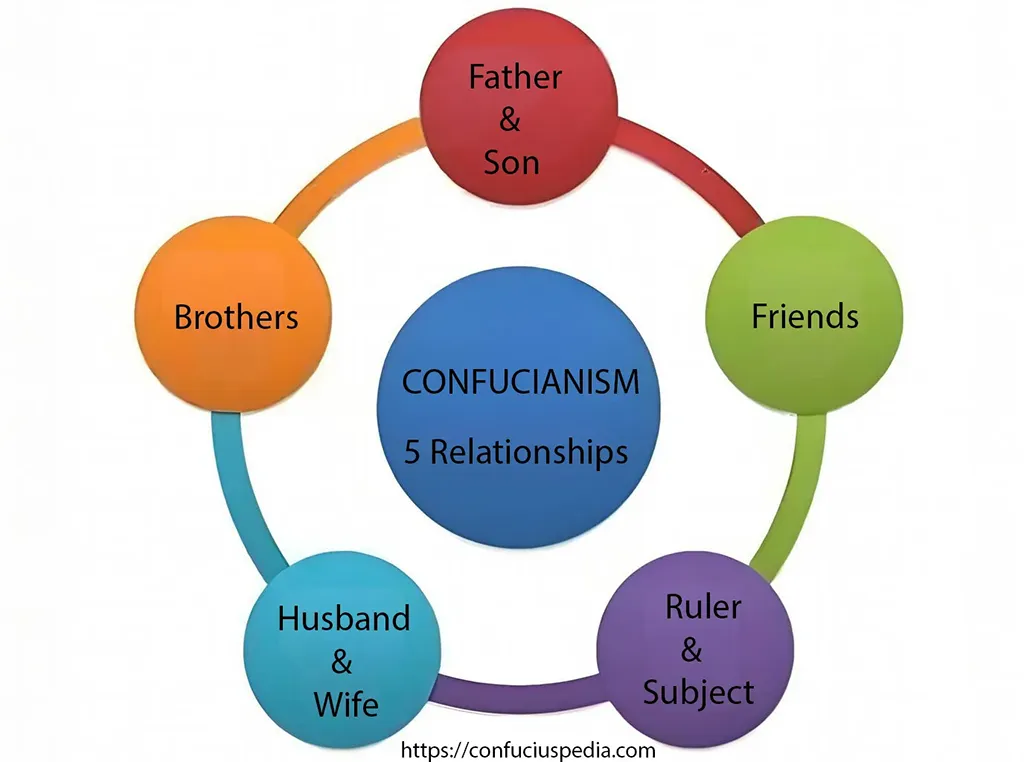Human ethics is the moral relationship between people. During the Warring States period, Mencius, a significant figure in Confucianism, introduced the concept of the Five Relationships, the most fundamental ethical relationship in Confucianism.
What are the Five Relationships? They refer to five types of human relations in ancient China and the rules of speech and behaviors that should be followed: the relationship between ruler and subject, father and son, husband and wife, and brothers and friends.
Confucius’s and Mencius’s Ideas about the Five Confucian Relationships
As the two most influential figures in Confucianism, Confucius and Mencius have a profound connection with the concept of Five Relationships.
Confucius did not directly propose the specific concept of Confucian “Five Relationships,” but his thought contains a profound understanding and explanation of human ethics.
Historical records show how human relations are explained in Confucius’s teachings, The Book of Documents, and The Spring and Autumn Annals. In the Analects of Confucius, Confucius mentions the relationship between “ruler and subject, father and son,” emphasizing that individuals should act according to their respective roles and identities. This embodies the fundamental norms of the relationships between the ruler and the minister, as well as that between the father and the son.
Mencius further developed this concept based on Confucius’s ideas, particularly by introducing the term “human ethics” for the first time in “Mengzi: Teng Wengong I (孟子·滕文公上).” Mencius systematically compiled and summarized traditional Chinese ethical norms in this work, providing a comprehensive overview of the five basic moral relations among people in feudal society. He also emphasized the roles and responsibilities of all parties and the “rules” to be followed.
The 5 Constant Relationships of Confucianism
The five key interpersonal relationships and their guidelines below, as outlined by Confucianism, can be seen as the prototype for interpersonal communication principles in modern society.
Father-and-Son Relationship in Confucianism
Paternity refers to the relationship between a father and his children.
Firstly, a father is endowed with qualities of love. As a family’s breadwinner, the father should exemplify unending love and care for their children.
Accordingly, the son should demonstrate filial piety. Filial piety is not only material provision but also a kind of inner worship.
A son should take timely care of his father’s physical and mental health and do his best to meet his legitimate needs. Especially when his father is old and infirm, a son should repay his father’s kindness with care.
In the Spring and Autumn with Zuo Zhuan (春秋左传), “affectionate father and dutiful son” (父慈子孝) are included in the value of Li.
Ruler-and-Subject Relationship in Confucianism
Mencius advocates the principle of “keeping righteousness between the ruler and the subjects” (君臣有义) to establish and maintain positive relationships between rulers and subjects.
Subjects should be faithful to their duties. Rulers must treat subjects according to Li.
The ruler and the subjects should support each other and work together to ensure the country’s prosperity and people’s well-being.
Besides, Mencius also mentions in Mencius that: “If the ruler treats his subjects as his brothers, they will treat him with heartfelt sincerity; if the ruler treats his subjects as a dog or a horse, they will treat him as a stranger; if the ruler treats his subjects as dirt or grass, they will treat him as an enemy.”
Thus, the ruler’s attitude toward his subjects determines the latter’s reaction to the former.
Husband-and-Wife Relationship in Confucianism
In a marriage, husbands and wives shoulder different responsibilities and complementary roles in the family.
On the one hand, a husband needs to care for his wife, educate his children, respect his parents, and be responsible for society. A wife should be responsible for her husband and children to free them from worries.
On the other hand, they have different priorities in matters within and outside the family. The husband and the wife should complement, help, respect, and love each other. Wives should understand, honor, and help their husbands, while husbands should understand and respect their wives.
In short, couples should treat each other courteously and face challenges and difficulties together.
Elder Brother and Younger Brother Relationship in Confucianism
When Confucius explained filial piety, he stressed the love between brothers. It coincides with Mencius’s advocacy of respect for seniority, brotherhood, and friendship.
Standards for Being a Good Student and Child (弟子规) says, “Whether you are drinking, eating, walking or sitting, let elders go first; younger ones should follow.”. It is a concrete practice of this rule.
The older brother should set an example by caring for his younger brother and helping him become moral and responsible.
At the same time, the younger brother should respect the older brothers and listen to their advice.
This relationship featuring mutual respect, love, and help between brothers contributes to a harmonious and united family.
Friendship in Confucianism
Friends are supposed to trust each other as a social group without blood ties.
Mencius once said, “Friends should trust each other.” It means that friends should trust and support each other and deliver their promises.
Friends should help each other in times of trouble, share joy in times of happiness, and go through the ups and downs of life together. In this way, friendship can be enhanced when people feel warm and happy when dealing with each other.
Confucius once said, “A person who gains no trust from others doesn’t know how to stand up in society.” Trust is the most precious bond between people and an indispensable element of friendship.
The Significance of Five Cardinal Relationships
Confucianism is vital in the 5 great relationships because it provides a systematic ethical framework for ancient Chinese society that regulates human behaviors.
Positive Political Purpose and Effects
The Five Relationships of Confucianism help maintain social stability and achieve effective governance. It creates a structured network of social relations with clear hierarchies and responsibilities by emphasizing ethical norms among rulers and subjects, parents and children, spouses, siblings, and friends. In this way, everyone fulfills their respective duties and obligations and plays their roles, promoting social stability and harmony.
In a harmonious and trustful society, government policies and actions are more likely to be understood and supported by the people. Therefore, it cannot only enhance the effectiveness of governance but also significantly reduce the costs of social governance, thereby achieving economic benefits.
Additionally, the moral qualities advocated by the five key Confucian relationships provide government officials with a code of conduct and ethical constraints, thus reducing corruption and abuse of power.
Influence on Chinese Culture and Institutions
More than just an ethical code, the Five Relationships as one category of basic beliefs in Confucianism have profoundly influenced the political systems, family structures, and educational philosophies of ancient China. They shaped Chinese people’s understanding of morality and the fundamental principles of social operation, thus becoming a vital factor in sustaining China’s culture and social system for thousands of years.
Promoting the Spread and Development of Confucianism
Confucianism is based on the core values of “Ren,” “Yi,” “Li,” “Zhi,” and “Xin.” The Five Relationships illustrate how these values are practiced daily via specific interpersonal connections. Each of them reflects the fundamental principles of Confucian morality. Confucianism emphasizes individual moral cultivation and social harmony, and the ethical codes of the 5 great relationships of Confucianism provide a pathway to achieving this goal.

